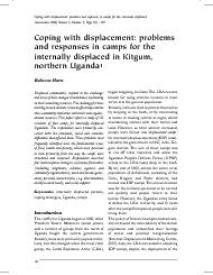Coping with displacement: problems and responses in camps for the internally displaced in Kitgum, northern Uganda
Displaced communities respond to the challenges and losses of their changed circumstances by drawing on their remaining resources. The challenge for those working in such contexts is how to effectively combine these community initiatives with their own organisational resources. This paper reports a study of 112 residents of four camps for internally displaced Ugandans. The respondents were primarily concerned with the structural, social and economic difficulties that affected them. Those problems most frequently identified were the fundamental issues of food, health and poverty, which were perceived to stem primarily from the way the camps were structured and resourced. Respondents described four main response strategies: assistance from others (including neighbours, relatives, agencies and community organisations); work and income generation; personal characteristics (e.g determination, ability to work hard); and social support.
Geachte bezoeker,
De informatie die u nu opvraagt, kan door psychotraumanet niet aan u worden getoond. Dit kan verschillende redenen hebben,
waarvan (bescherming van het) auteursrecht de meeste voorkomende is. Wanneer het mogelijk is om u door te verwijzen naar de bron
van deze informatie, dan ziet u hier onder een link naar die plek.
Als er geen link staat, kunt u contact opnemen met de bibliotheek,
die u verder op weg kan helpen.
Met vriendelijke groet,
Het psychotraumanet-team.
Reference:
Rebecca Horn | 2009
In: Intervention: the international journal of mental health, psychosocial work and counselling in areas of armed conflict, ISSN 1571-8883 | 7 | 2 | 110-129
http://www.interventionjournal.com/sites/default/files/72%20Horn.pdf
In: Intervention: the international journal of mental health, psychosocial work and counselling in areas of armed conflict, ISSN 1571-8883 | 7 | 2 | 110-129
http://www.interventionjournal.com/sites/default/files/72%20Horn.pdf


